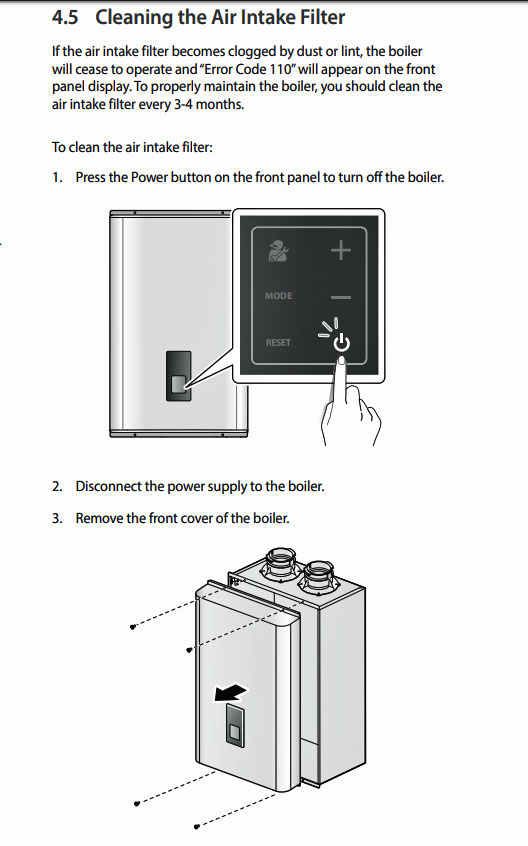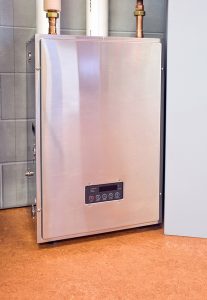A tankless water heater can switch from hot to cold due to insufficient water flow or a malfunctioning unit. Check the water pressure and ensure the heater is functioning properly.
Tankless water heaters offer endless hot water, making them a popular choice for many households. However, users sometimes face issues where the water temperature fluctuates unexpectedly. This problem can arise from various factors, such as inadequate flow rates, sediment buildup, or unit malfunctions.
Understanding the root causes can help you restore consistent hot water. Regular maintenance and prompt attention to any issues are crucial for optimal performance. This guide will explore common reasons for temperature fluctuations and provide actionable solutions to ensure a reliable hot water supply in your home.
Page Contents
- 1 Introduction To Tankless Water Heater Temperature Fluctuations
- 2 Initial Checks Before Troubleshooting
- 3 Cleaning The In-line Filter
- 4 Dealing With Hard Water Issues
- 5 Adjusting The Flow Rate
- 6 System Overload Solutions
- 7 Cross-flow And Mixing Valve Adjustments
- 8 When To Call A Professional
- 9 Preventive Measures And Regular Maintenance
- 10 Frequently Asked Questions
- 11 Conclusion
Introduction To Tankless Water Heater Temperature Fluctuations
Tankless water heaters can have temperature fluctuations. These changes can be frustrating. Knowing the common signs of inconsistent water temperature is helpful.
- Water suddenly turns hot or cold during use.
- Temperature changes when more water is used.
- Strange noises come from the heater.
- Water takes longer to heat up.
Addressing these fluctuations is important. Comfort is a key reason. Consistent hot water improves daily tasks. It also helps save energy and reduces costs. Understanding these signs can lead to better maintenance.
Initial Checks Before Troubleshooting
Check the power supply to ensure it is connected properly. Look for any tripped breakers or blown fuses. Make sure the temperature settings are correct. Adjust them according to your needs.
Next, verify the water pressure. It should be stable and within the recommended range. Low pressure can cause the heater to fluctuate between hot and cold. Use a pressure gauge to measure it accurately. If the pressure is too low, check for any blockages in the pipes.
Cleaning The In-line Filter
Cleaning the in-line filter helps keep your tankless water heater working well. Follow this simple step-by-step guide for cleaning.
- Turn off the power and water supply to the heater.
- Locate the in-line filter. It is usually near the inlet.
- Unscrew the filter cover carefully.
- Remove the filter and rinse it under warm water.
- Check for any debris or buildup. Clean it gently.
- Reinstall the filter and cover it tightly.
- Turn the water supply and power back on.
Regular maintenance helps prevent issues. Aim to clean the filter every 6 months for best results.
Dealing With Hard Water Issues
Hard water can cause many problems for your tankless water heater. It contains minerals like calcium and magnesium. These minerals can build up over time. This buildup can lead to reduced efficiency and shorter lifespan of your heater.
Using a water softener can help solve these issues. A water softener removes the hard minerals. This process helps to keep your heater running smoothly. Regular maintenance is important to ensure your system stays in good shape.
| Effects of Hard Water | Solutions |
|---|---|
| Mineral buildup | Use a water softener |
| Reduced efficiency | Regular maintenance |
| Shorter lifespan | Flush the system regularly |
Adjusting The Flow Rate
Finding the optimal flow rate is key for your tankless water heater. Start by checking the manufacturer’s instructions. This helps understand the maximum flow rate for your unit.
Use a flow meter to measure the water flow. Adjust the flow rate by changing the settings on the heater. Reducing the flow can provide consistent hot water.
Ensure the inlet water temperature is appropriate. Cold water affects the heater’s ability to produce hot water. Regular maintenance also plays a role in maintaining efficiency.
Remember to test the water temperature after adjustments. This ensures that the heater delivers the desired heat level. Keeping an eye on these factors can prevent sudden hot to cold shifts.

Credit: terrylove.com
System Overload Solutions
Recognizing signs of overload is essential for maintaining your tankless water heater. Watch for sudden temperature changes. If water goes from hot to cold, it indicates a potential issue. Check for low water pressure. This can also affect performance.
How to reduce system demand can help keep your water heater running smoothly. Limit the number of appliances using hot water at once. Take shorter showers to ease the strain. Turn down the temperature setting on your heater.
Regular maintenance is vital. Flush the heater every six months to remove mineral buildup. This helps improve efficiency and prevents overheating.
Cross-flow And Mixing Valve Adjustments
Cross-flow issues can cause sudden changes in water temperature. This happens when cold water mixes with hot water. Adjusting the mixing valve is essential for a stable temperature. A well-set mixing valve keeps hot water consistent.
To fix mixing valve settings, check the temperature control. Make sure the valve is not stuck. Cleaning the valve may help if it is dirty. Adjust it according to the manufacturer’s instructions.
Regular maintenance helps prevent cross-flow problems. Always monitor your water heater’s performance. This ensures a safe and comfortable experience.
When To Call A Professional
Identifying complex issues with your tankless water heater can be tricky. Signs like inconsistent water temperature often mean trouble. Strange noises or leaks can indicate serious problems. These issues require expert help.
Benefits of a professional assessment include accurate diagnosis and safe repairs. Experts have the right tools and knowledge. They can spot hidden problems that you might miss. Timely help can prevent further damage and save money.
Don’t ignore warning signs. Calling a professional early can ensure your water heater runs smoothly. It also keeps your home safe and comfortable.
Preventive Measures And Regular Maintenance
Regular maintenance is key for a tankless water heater. Routine checks help identify issues early. Clean filters and vents to ensure optimal performance. This prevents hot to cold fluctuations.
Long-term upkeep offers many benefits. It can extend the life of the heater. Regular maintenance also improves energy efficiency. Lower energy bills make a big difference. You will enjoy consistent hot water every time.
| Benefit | Description |
|---|---|
| Extended Lifespan | Regular checks help keep the heater running longer. |
| Energy Efficiency | Maintenance ensures the heater uses less energy. |
| Consistent Performance | No sudden changes from hot to cold water. |

Credit: www.serviceexperts.com

Credit: www.mydadcandothat.com
Frequently Asked Questions
Why Does My Tankless Water Heater Temperature Fluctuate?
Tankless water heater temperature fluctuations can occur due to inconsistent water flow, sediment buildup, or insufficient gas supply. Adjusting the flow rate, flushing the system, and ensuring proper gas pressure can help stabilize temperature. Regular maintenance is crucial for optimal performance and consistent hot water delivery.
Why Is My Tankless Water Heater Getting Hot Then Cold?
A tankless water heater may fluctuate between hot and cold due to insufficient gas supply, mineral buildup, or a malfunctioning thermostat. Check for blockages in the venting system or sediment in the heat exchanger. Regular maintenance helps ensure consistent water temperature.
Why Is My Tankless Water Heater Not Staying Hot?
Your tankless water heater may not stay hot due to a faulty thermostat, mineral buildup, or insufficient gas supply. Check for clogs in the water filter and ensure adequate power supply. Regular maintenance can help prevent these issues and ensure consistent hot water.
Why Does My Tankless Water Heater Go Cold In The Middle Of The Shower?
Your tankless water heater may go cold due to high demand for hot water. It can also happen if the unit is undersized for your needs. Sediment buildup or a malfunctioning component can disrupt water flow. Regular maintenance helps prevent these issues and ensures consistent hot water supply.
Conclusion
Experiencing fluctuations in hot water can be frustrating. Understanding the causes can help you find solutions. Regular maintenance and proper settings are key. If problems persist, consider consulting a professional. Ensuring your tankless water heater functions optimally will enhance comfort and efficiency in your home.
Enjoy consistent hot water every day!
